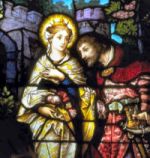Make your gift today!
Help keep Catholics around the world educated and informed.
Already donated? Log in to stop seeing these donation pop-ups.
Fathers of the Church
Letter CCXXXIV: to the Same, in Answer to Another Question
by Basil the Great in 357-370 | translated by Blomfield Jackson, M.A
Do you worship what you know or what you do not know? If I answer, I worship what I know, they immediately reply, What is the essence of the object of worship? Then, if I confess that I am ignorant of the essence, they turn on me again and say, So you worship you know not what. I answer that the word to know has many meanings. We say that we know the greatness of God, His power, His wisdom, His goodness, His providence over us, and the justness of His judgment; but not His very essence. The question is, therefore, only put for the sake of dispute. For he who denies that he knows the essence does not confess himself to be ignorant of God. because our idea of God is gathered from all tire attributes which I have enumerated. But God, he says, is simple, and whatever attribute of Him you have reckoned as knowable is of His essence. But the absurdities involved in this sophism are innumerable. When all these high attributes have been enumerated, are they all names of one essence? And is there the same mutual force in His awfulness and His loving-kindness, His justice and His creative power, His providence and His foreknowledge, and His bestowal of rewards and punishments, His majesty and His providence? In mentioning any one of these do we declare His essence? If they say, yes, let them not ask if we know the essence of God, but let them enquire of us whether we know God to be awful, or just, or merciful. These we confess that we know. if they say that essence is something distinct, let them not put us in the wrong on the score of simplicity. For they confess themselves that there is a distinction between the essence and each one of the attributes enumerated. The operations are various, and the essence simple, but we say that we know our God from His operations, but do not undertake to approach near to His essence. His operations come down to us, but His essence remains beyond our reach.
2. But, it is replied, if you are ignorant of the essence, you are ignorant of Himself. Retort, If you say that you know His essence, you are ignorant of Himself. A man who has been bitten by a mad dog, and sees a dog in a dish, does not really see any more than is seen by people in good health; he is to be pitied because he thinks he sees what he does not see. Do not then admire him for his announcement, but pity him for his insanity. Recognise that the voice is the voice of mockers, when they say, if you are ignorant of the essence of God, you worship what you do not know. I do know that He exists; what His essence is, I look at as beyond intelligence. How then am I saved? Through faith. It is faith sufficient to know that God exists, without knowing what He is; and "He is a rewarder of them that seek Him ." So knowledge of the divine essence involves perception of His incomprehensibility, and the object of our worship is not that of which we comprehend the essence, but of which we comprehend that the essence exists.
3. And the following counter question may also be put to them. "No man hath seen God at any time, the Only-begotten which is in the bosom hath declared him.' What of the Father did the Only-begotten Son declare? His essence or His power? If His power, we know so much as He declared to us. If His essence, tell me where He said that His essence was the being unbegotten ? When did Abraham worship? Was it not when he believed? And when did he believe? Was it not when he was called? Where in this place is there any testimony in Scripture to Abraham's comprehending? When did the disciples worship Him? Was it not when they saw creation subject to Him? It was from the obedience of sea and winds to Him that they recognised His Godhead. Therefore the knowledge came from the operations, and the worship from the knowledge. "Believest thou that I am able to do this ?" "I believe, Lord;" and he worshipped Him. So worship follows faith, and faith is confirmed by power. But if you say that the believer [also knows, he knows from what he believes; and vice versa he believes from what he knows. We know God from His power. We, therefore, believe in Him who is known, and we worship Him who is believed in.
Taken from "The Early Church Fathers and Other Works" originally published by Wm. B. Eerdmans Pub. Co. in English in Edinburgh, Scotland, beginning in 1867. (PNPF II/VIII, Schaff and Wace). The digital version is by The Electronic Bible Society, P.O. Box 701356, Dallas, TX 75370, 214-407-WORD.






